How To Close a Business in the Philippines: An Ultimate Guide
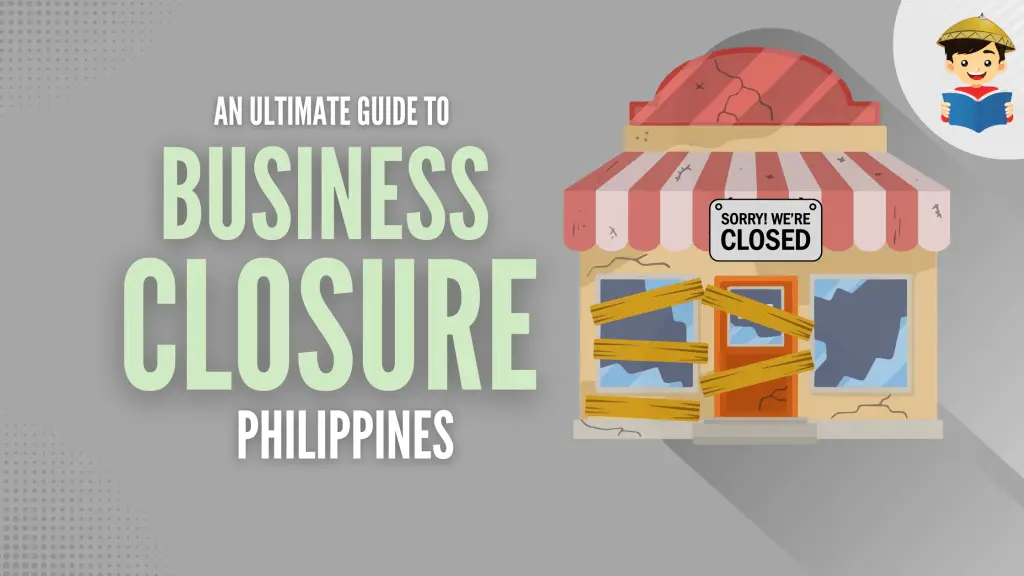
Imagine closing a failed business from 10 years ago when suddenly, the BIR comes knocking at your door, demanding you to pay Php 50,000 because of some tax return you forgot to file years AFTER you supposedly closed your business.
This scenario is expected in the Philippines because the requirements to close a business properly are not properly disseminated to our business owners.
It’s not the fault of the BIR either if they penalize you; they follow a system that detects taxpayers who fail to file their tax returns on time. They must check why the taxpayer failed to file and collect the unpaid tax. You have to understand that simply ceasing operations does not mean “closed” in the eyes of the law.
This article teaches you how to properly close a business to avoid lawsuits and unnecessary penalties from BIR and other government agencies.
Disclaimer: This article is for general information only and is no substitute for professional advice.
Table of Contents
What Are the Common Reasons Why People Close a Business?
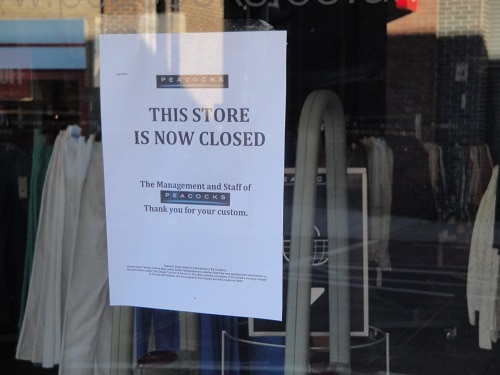
1. Bankruptcy
A business filing for bankruptcy may be due to the obsolescence of its product, tough competition, or unbearable interest expenses on its loans.
However, filing for bankruptcy does not mean you don’t have to pay your creditors anymore; under the Financial Rehabilitation and Insolvency Act or FRIA2, your creditors can liquidate your business and take whatever cash or property they can.
2. Poor Business Plan
A poorly created business plan is one of the main reasons why a business is forced to close. Failure to define the goals and steps to achieve those goals makes a weak business foundation.
A business plan includes researching the following:
- The strengths of your products or services;
- Your product’s/services’ weaknesses or shortcomings;
- Your competition and what they lack; and
- Opportunities to exploit your strengths and your competition’s shortcomings.
3. Poor Management
Having a high-quality product is a good start toward a successful business, but that’s not the end-all. Failure to properly manage your employees, creditors, and suppliers may be detrimental to your business.
A poorly-managed business fails to use the following long-term strategies:
- Attend business seminars from reputable sources like BIR, DOLE, and TESDA to learn how to manage a business properly and its stakeholders and to know about the appropriate laws to follow;
- Hire an accountant to help you manage your finances. This will also deter theft from other employees;
- Hire a human resource manager if you have more than 20 employees; and
- Carefully read your contracts from your suppliers and creditors to ensure that you understand them to not risk yourself and your business by violating any conditions.
4. Uncontrollable Events
Even if you are the greatest business owner of all time, surely there are things you can’t control, like your health, death, recessions, or, for example, a pandemic that resulted in millions of Filipinos to be laid off and caused businesses to stop operations3.
To be more precise, around 119,596 businesses in the Philippines were forced to shut down in 20204. It’s the consequence of the government imposing a months-long lockdown that decimated businesses, especially those that hadn’t adapted to e-commerce. The number of enterprises that closed shops translated into Php 7.767 billion in lost revenues for the government.
Disaster avoidance plans, contingency funds, and insurance might help businesses overcome tough, uncontrollable situations.
5. Business Reorganization
Not all business closures are because of failure to operate the business properly, some want to expand or rebrand their business into another type of business (e.g., Sole proprietorship to a Corporation or a Partnership to a Corporation).
Related: What is the difference between a one-person company and a sole proprietorship?
Whatever the reason is, it is necessary that you understand the pros and cons of the reorganization and adequately close the existing business to avoid incurring penalties.
6. Involuntary Closure
The most notable example of this is when your business has been force-closed by a regulating body (e.g., SEC, DTI, DOLE, or BIR) for violating a regulation or law like child labor, failure to pay taxes, fraud, etc. However, this forced closure will only be done after careful examination, notices, and hearings.
In order not to get fined or criminalized and risk your business from being force-closed, you should follow all the laws required or hire someone who can help, like a lawyer or an accountant.
How To Close a Business in the Philippines: 4 Steps
Step 1: Determine which classification you belong to

a. Sole Proprietorship
This includes individual business owners, including freelancers, home-based consultants, self-employed professionals, and anyone who is regularly earning income outside an employer-employee relationship. Of course, this only applies to those who registered their business (which you should do if you are any of the above).
Sole proprietors must apply for the cancellation of their business with the Department of Trade and Industry Business (DTI).
b. Corporations and Partnerships
Juridical persons, including joint ventures, cooperatives, and other organizations required to register with the Security and Exchange Commission (SEC), are also required to apply for the cancellation of their business with the SEC.
According to SEC Memorandum Circular No. 5, Series of 20225, corporations may apply for voluntary dissolution through the SEC Company Registration and Monitoring Department (CRMD) or SEC’s Extension Offices.
Note that SEC allows the dissolution of corporations provided that no creditors will be affected.
Step 2: Complete the requirements for the cessation of business

Before applying for business closure, you must call the appropriate government agency and your local government unit to clarify which documents are needed.
Requirements for Closing a Business in the Philippines
NOTE: Every document applies to all classifications of taxpayers except when it specifically mentions that it only applies to a certain type.
1. Local Government Unit – Barangay Hall
a. Valid ID
- Sole Proprietorship/Freelancers/Self-employed Professionals – Valid ID of the owner;
- Partnerships – Valid ID of all Partners;
- Corporation – Valid ID of the President.
b. Barangay Clearance
This is the most basic legal document you need to have to transact with other government agencies or departments. You can request this at the barangay where your business is located.
c. Letter of Request for Retirement/Closure of Business
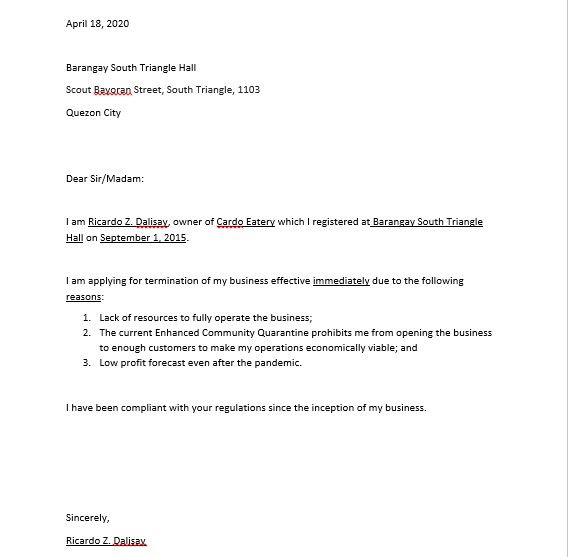
Free Download: Sample Letter Request template
This letter shall signify your intention to cancel your business registration with your barangay. The letter must indicate the following:
- Date of application;
- Contact details of the addressee (the Barangay Hall);
- Name of the applicant;
- Registered business name;
- Date of registration with the government, in this case, the barangay;
- Business permit number;
- Reason/s for the closure of business;
- Proposed date of closure; and
- A declaration that the business has no outstanding obligation or liability with the barangay.
2. Local Government Unit – City Hall
a. Valid ID
- Sole Proprietorship/Freelancers/Self-employed Professionals – Valid ID of the owner;
- Partnerships – Valid ID of all Partners;
- Corporation – Valid ID of the President.
b. Barangay Clearance
c. Barangay Certificate of Closure Indicating Date of Closure
This shall prove that you have already settled all existing liabilities and successfully closed your business at the barangay level.
d. Latest Business Permit
You must submit the original copy of the latest business permit available.
e. Affidavit of Closure, Board Resolution, or Notice of Dissolution Indicating the Exact Date of Closure
NOTE: Affidavits are required to be notarized.
Sole Proprietorship
If you are a sole proprietor, your affidavit of closure must include the following:
- Name of the owner;
- Address of the business;
- Registration No. from DTI and/or BIR;
- Date of Closure;
- Reason for closure;
- That the business has no outstanding liabilities.
Free Download: Sample Template of Affidavit of Closure of Business for Sole Proprietors
Partnership
Original Partnership Dissolution Agreement or Notice of Dissolution indicating the exact date of closure. This document sets how the property and obligations of the partnership will be divided among all partners.
Free Download: Sample Template of Notice of Dissolution
Corporation
Original Board Resolution or Corporate Secretary Certificate on the closure of business indicating the exact date of closure.
f. BIR Form 2303 or Certificate of Registration
The original copy must be presented, while a photocopy must be submitted. This shall be proof that you registered with the BIR during the course of your business.
Related: How to Get BIR Form 2303 (Certificate of Registration): An Ultimate Guide
g. Latest ITR and Financial Statements
The latest income tax returns and financial statements (e.g., Balance Sheets, Income Statement, Statement of Cashflows, etc.) for the three (3) preceding years of the retirement date must be photocopied and submitted to the City Hall where your business is located.
h. Latest VAT and OPT Returns
The latest business taxes filed from the last payment of the business permits up to the closure date must be photocopied and submitted to the City Hall where your business is located.
i. Books of Accounts
The City Hall where your business is located may request that you present your books of accounts to be examined by their staff.
j. If with branches, proof of business tax payment from the LGUs governing the branches
This shall be proof of your compliance with other LGUs.
3. Bureau of Internal Revenue (BIR)
As per Revenue Memorandum Circular No. 57-20206, the list of requirements for closing business in BIR has been streamlined. Here’s the list of requirements you must prepare:
- Notice of closure or cessation of business
Sample Filled Out BIR Form 1905 for Sole Proprietors:
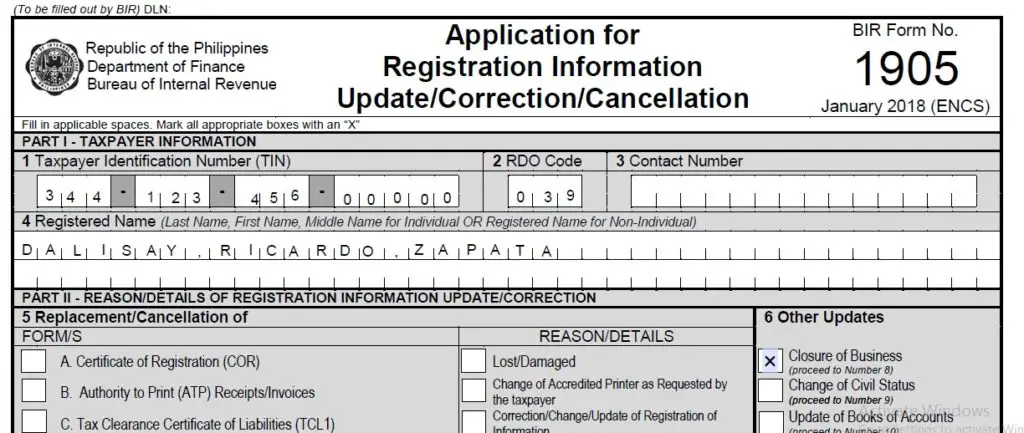


Partnerships and Corporations
Closing a partnership or a corporate business requires that the TIN of the Juridical Person is also canceled.
Sample Filled Out BIR Form 1905 for Partnerships and Corporations:
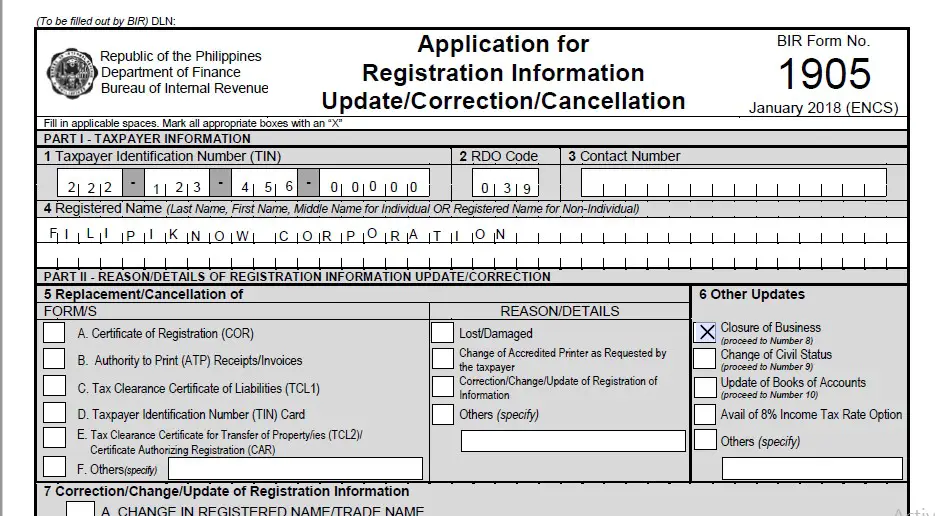
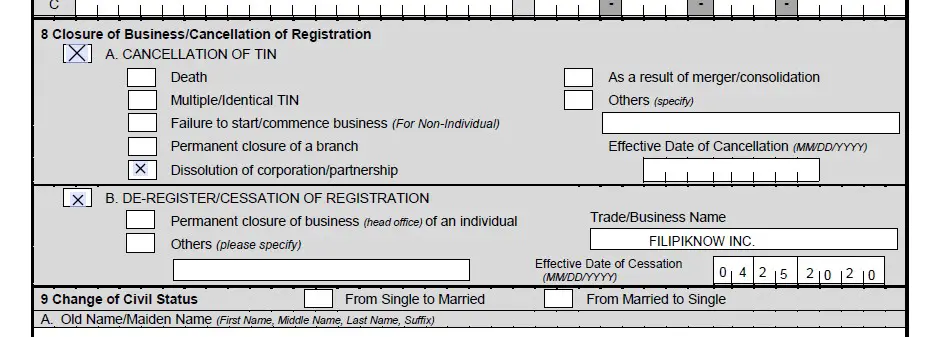
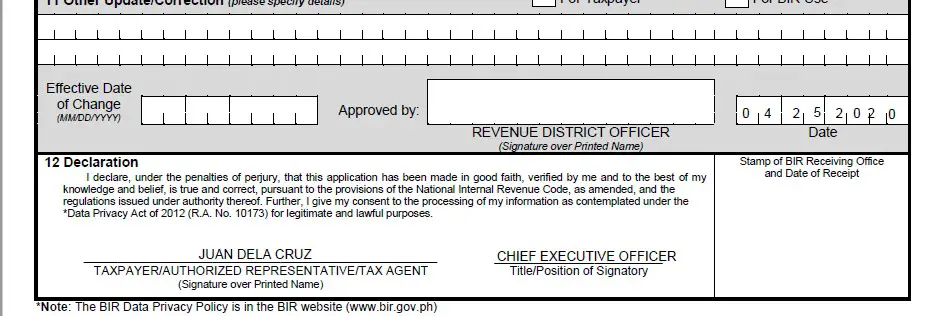
4. Department of Trade and Industry (DTI)
a. Letter of Request for Cancellation of Business Name
This letter shall signify your intention to cancel your business name. The letter must indicate the following:
- Date of application;
- Contact details of the addressee (DTI Head Office);
- Name of the owner/partner/president, whichever is applicable;
- Registered business name;
- Date of registration of the business name;
- Certificate of Registration Number;
- Reason/s for the closure of business; and
- Proposed Date of Closure.
Free Download: Sample Template of Letter of Request for Cancellation of Business Name (DTI)
b. Affidavit of the Cancellation of the Registered Business Name
Stating the reason/s for closure and, at the time of the closure, that the business has no outstanding financial obligation in connection with the operation.
Free Download: Sample Template of Affidavit of the Cancellation of the Registered Business Name
c. Original copies of the business name certificate of registration
d. Affidavit of Loss of BN Certificate or Certificate of Registration, if applicable
e. Certified photocopy of the SEC certificate of dissolution of the corporation/partnership
5. Securities and Exchange Commission (SEC)
a. Request for Voluntary Dissolution
The request7 must be signed by the corporation’s authorized representative and should include the following:
- The corporate name, SEC registration number, corporation’s principal office, and email address
- Name, position, and mailing address of the authorized representative
- Reason for dissolution
- Copy of notice to shareholders and members for a meeting for the purpose of the corporation’s dissolution
b. Notarized copy of Board Resolution that indicates the dissolution of the corporation and the designation of the authorized representative
c. Latest due General Information Sheet (GIS)
d. Audited Financial Statement (AFS) as of last fiscal year
e. BIR Tax Clearance
f. Affidavit from the president and treasurer indicating that the dissolution is not prejudicial to the interest of the creditors and there’s no opposition from them
g. Notarized Secretary’s Certificate of No Pending Case of Intra-Corporate Dispute
h. Clearance/Favorable recommendation from other SEC departments or from an appropriate regulatory agency, when necessary
Step 3: Officially announce the closure of business to your stakeholders

Announcing that your business will be closing soon may seem unnecessary. Not only will it help you smoothly transition into your next plan, but it is also legally required by different government departments.
Your stakeholders are all the people and businesses interested in your business. These are your:
a. Employees
DOLE requires employers to notify their employees that the business is closing at least 30 days from the intended closure date. Also, separation pay must be given to the employees if the closure is not due to bankruptcy or insolvency.
To properly announce the termination of employees due to the closure of business, the company must:
- Send individual termination letters to the employees and DOLE Regional office where the employee is located stating: (1) The reason for termination (e.g., due to closure of business); (2) That the notice was given within 30 days from the day of closure; and (3) That a separation pay will be given to the employee. The Notice of Termination is valuable as it’s one of the requirements that the employees need should they decide to avail of the SSS unemployment insurance, a cash benefit they can use to stay afloat while looking for a new job.
- Conduct a company-wide meeting explaining what will happen to them, what they will receive etc. This is also the time to answer employees’ queries and address their concerns regarding their job status. It is essential to be as transparent as possible. This is optional but as significant as losing one’s job, it is polite to address their worries properly.
Failure to follow the above requirement is grounds for an illegal dismissal lawsuit.
b. Suppliers and Creditors
Simply calling or emailing your suppliers and creditors, notifying them about your intention to close your business, is enough. However, you must still follow the contracts made with your supplier and creditors in the event of the closure of business to make sure that you do not violate any provision or term in the contract.
Failure to observe this process is grounds for a lawsuit from your supplier or creditor.
c. Regulatory Agencies
You need to notify the relevant government agencies that regulate your business to get government clearances that would signify that you are compliant with the laws. For more information, please see Step 4.
d. Shareholders and Business Partners
Closing a juridical entity like a corporation or a partnership must undergo a series of meetings and decision-making by its owners.
For a partnership, the partners shall notify the other partners that a meeting with the agenda to dissolve the partnership will commence. This is done preferably via email.
For a corporation, at least twenty (20) days before the meeting, notice shall be given to each shareholder by any means authorized under its bylaws, stating that the corporation shall be dissolved. Then at the meeting, the shareholders and the directors shall vote on whether or not the corporation shall be dissolved.
e. Customers
To notify your customers, you could post a written notice within the vicinity of the business stating that the business will close on the proposed date. You also have the option to call key customers and inform them that you will no longer be doing business with them.
This is optional, but it is not bad to still have a healthy relationship with your key customers because they were the ones that helped you build your business.
f. Other ways to announce the closure of your business
- Via your website – a letter to your stakeholders announcing your business’s closure, including the closure details.
- Via newsletters or social media groups/pages – You may issue a statement detailing the facts of the closure and how it may affect local businesses in your area. This is recommended for big enterprises that have a large impact on the local economy to enable other local businesses to adjust to the changes brought by the cessation of your operations.
Step 4: Submit requirements to appropriate government agencies to obtain the required clearances
Before we proceed, please take note of the following:
- Before applying for the closure of your business, you need to settle all your pending cases with the BIR, DOLE, DTI, and/or SEC.
- The government does not know when you stopped your business operations that’s why they still expect you to comply with your obligations until you get the appropriate government clearance (e.g., Filing Tax Returns; Mandatory Contributions for SSS, Philhealth, and Pag-IBIG; Payment of local government fees and taxes like business permits).
a. Closing a Sole-Proprietorship/Freelance/Self-employed Professionals
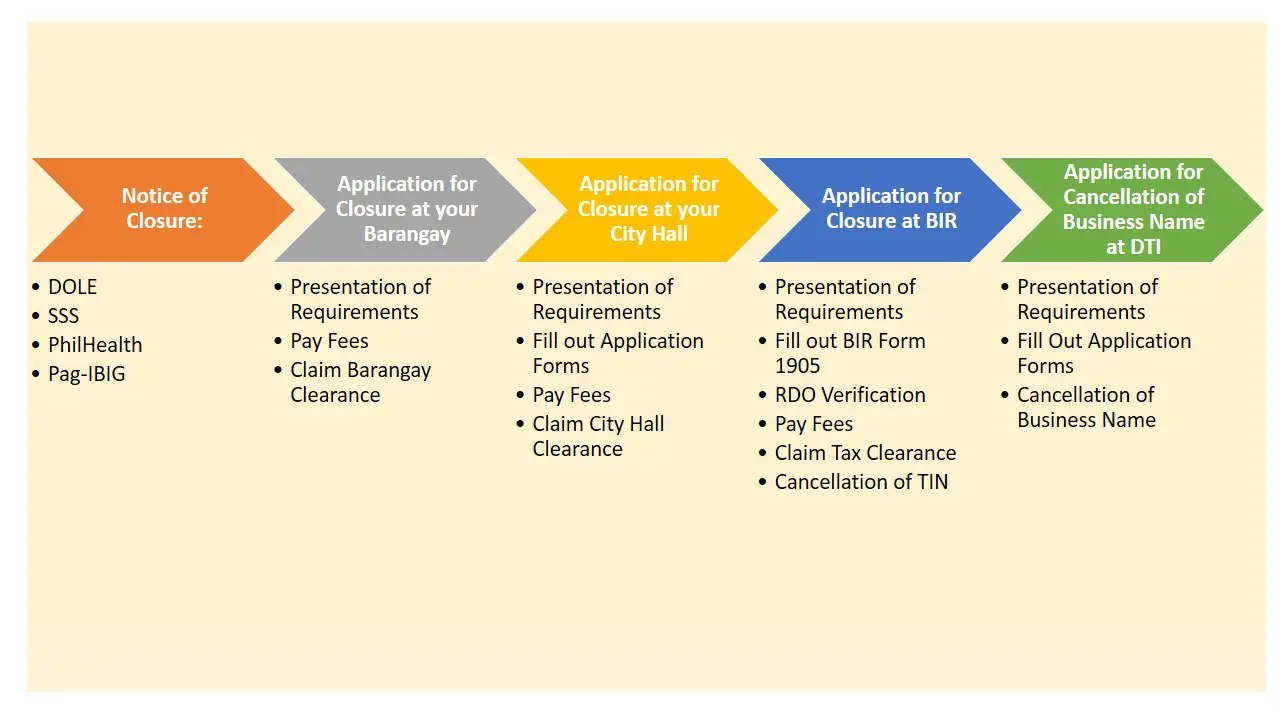
i. Notice of Closure to DOLE, SSS, PhilHealth, and Pag-IBIG
- Send a service of a written notice to the employees and the DOLE at least one (1) month before the intended date of closure/cessation. This will lower the risk of getting illegal dismissal lawsuits.
- Update SSS, PhilHealth, and Pag-IBIG registration to Unemployed or Employed, whichever is applicable. This will allow you to control your mandatory contributions and notify them that you no longer have employees.
ii. Application for Closure at your LGU – Barangay
- Create a Letter of Request for Retirement/Closure of Business.
- Present the required documents (see Step 2 for the list of requirements) to the Barangay Hall where your business is located.
- Pay the necessary fees, including unpaid business permits or, depending on the LGU, facilitation fees.
- Claim Barangay Certificate of Closure which shall be used as a document to apply for closure of business at the City Hall Level.
iii. Application for Closure at your LGU – City Hall
- Create an Affidavit of Closure/Dissolution Indicating the Exact Date of Closure.
- Present the required documents (see Step 2 for the list of requirements) to the City Hall where your business is located.
- Depending on the LGU, there are application forms needed to be filled out. These application forms need only basic information.
- Pay the necessary fees, including unpaid business permits or, depending on the LGU, facilitation fees.
- Claim City Hall Certificate of Closure which shall be used as a document to apply for closure of business at the BIR.
iv. Application for Closure at BIR
- Fill-out two original copies of BIR Form 1905.
- Prepare the rest of the documentary requirements. These include the list of your business’ ending inventory, inventory of unused sales invoices/ORs, business notices and permits, and Certificate of Registration.
- Submit the BIR Form 1905 and other requirements to the RDO where the business is registered within 10 days from its closure
v. Application for Cancellation of Business Name at DTI
- Create a Letter of Request for Cancellation of the Business Name.
- Create an Affidavit of Cancellation of the Registered Business Name.
- Create an Affidavit of Loss if you lost the Certificate of Registration of Business Name.
- Present the required documents (see Step 2 for the list of requirements) to the DTI Head Office.
- Claim Certificate of Cancellation of Business Name.
b. Dissolution and Closure of a Corporation and a Partnership
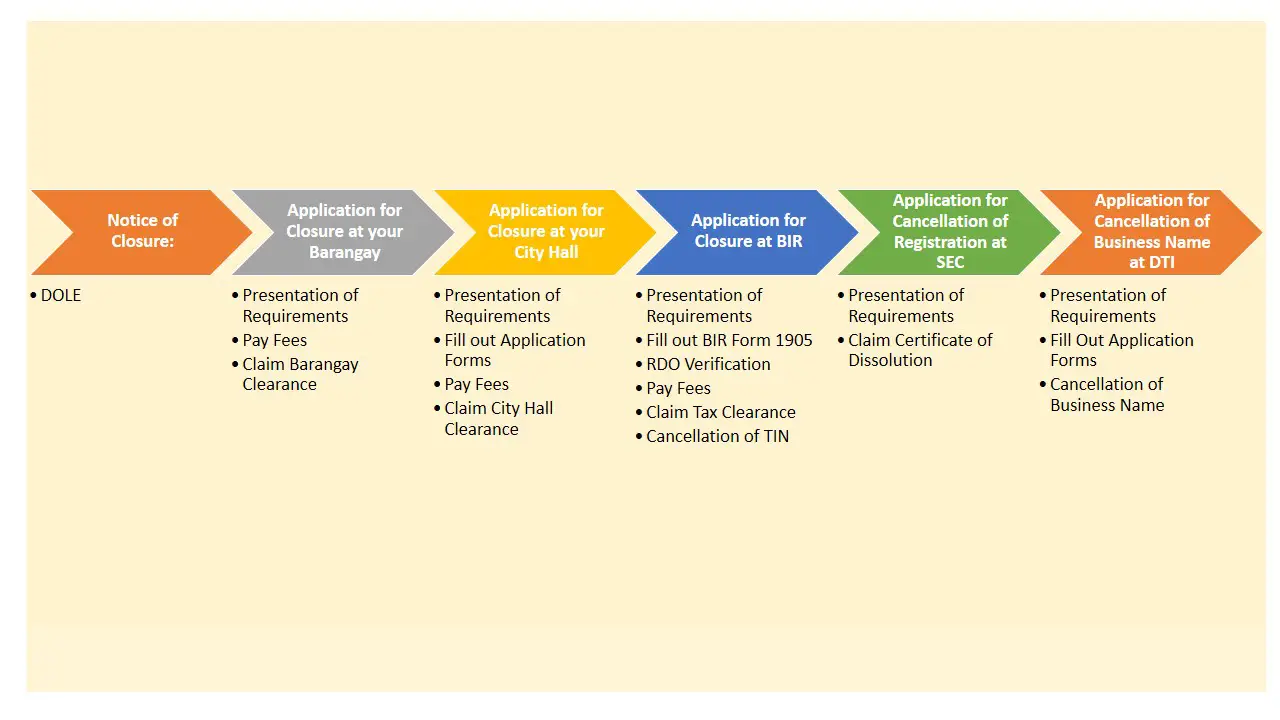
i. Notice of Closure to DOLE, SSS, PhilHealth, and Pag-IBIG
Send a service of a written notice to the employees and the DOLE at least one (1) month before the intended date of closure/cessation. This will lower the risk of getting illegal dismissal lawsuits.
ii. Application for Closure at your LGU – Barangay
- Create a Letter of Request for Retirement/Closure of Business.
- Present the required documents (see Step 2 for the list of requirements) to the Barangay Hall where your business is located.
- Pay the necessary fees, including unpaid business permits or, depending on the LGU, facilitation fees.
- Claim Barangay Certificate of Closure which shall be used as a document to apply for closure of business at the City Hall Level.
iii. Application for Closure at your LGU – City Hall
- Provide Board Resolution in case of Corporations or Notice of Dissolution in case of Partnerships.
- Present the required documents (see Step 2 for the list of requirements) to the City Hall where your business is located.
- Depending on the LGU, there are application forms needed to be filled out. These application forms need only basic information.
- Pay the necessary fees, including unpaid business permits or, depending on the LGU, facilitation fees.
- Claim City Hall Certificate of Closure which shall be used as a document to apply for closure of business at the BIR.
iv. Application for Closure at BIR
- Fill out BIR Form 1905.
- Create a Notice of Dissolution/Board Resolution.
- Present the required documents (see Step 2 for the list of requirements) to the RDO where your head office is located.
- If necessary, file for short-period tax returns when you decide to end your business in the middle of a taxable year. This shall be done within 30 days from the adoption of the resolution to dissolve or when it was notified by the SEC to dissolve.
- Destroy all unused sales invoices/ official receipts, accounting forms, business notices, and the Certificate of Registration in front of BIR Personnel and Officials.
- Wait for the RDO to verify that you have no open or delinquent cases and, after a tax audit, verify that you have no more outstanding liabilities with the Bureau.
- Pay the necessary fees and other deficiency taxes
- Claim Tax Clearance.
v. Application for Dissolution at SEC
- Obtain Clearance from other regulatory agencies if your corporation has secondary licenses (e.g., PEZA, BOI, BMBE, etc.).
- Present the required documents (see Step 2 for the list of requirements) to the SEC.
- Claim Certificate of Dissolution from SEC
vi. Application for Cancellation of Business Name at DTI
- Create a Letter of Request for Cancellation of the Business Name.
- Create an Affidavit of Cancellation of the Registered Business Name.
- Create an Affidavit of Loss if you lost the Certificate of Registration of Business Name.
- Present the required documents (see Step 2 for the list of requirements) to the DTI Head Office.
- Claim Certificate of Cancellation of Business Name.
What Are the Benefits of Properly Closing a Business in the Philippines?
1. Government clearance
Once you’re validated for closing business in a government agency, the agency will provide you with a government clearance. This shall be used as proof that you are compliant with all their regulations.
One example is the BIR Tax Clearance which signifies that you have no existing tax liabilities and open cases. This shall be used when you apply for a new business, cancel your business name, property auctions, and for immigration purposes.
2. Moving on and learning from your mistakes
Losing a business, especially those inherited from previous generations, will hit you hard. Regardless of the reason for the business closure, you will learn something useful for future businesses you’ll create. Even if you choose never to venture again into the commerce of trading or providing services, the experiences you gain are priceless.
Tips and Warnings
1. Consult a professional if needed
If you plan on dissolving or closing your business, finding a professional who will assist you (e.g., an accountant or lawyer) is always helpful. The benefits of their services are often worth the cost, considering that the penalties for failing to close your business properly are very hefty.
2. Call the government agency for clarification
Closing your business is complicated and requires a lot of research. Thankfully, if you take the time to call each government unit, they will assist you with the procedures and requirements they need.
Frequently Asked Questions
1. What are the penalties for not closing the business properly?
Bureau of Internal Revenue (BIR)
a. Open Cases Resulting in Compromise Penalties
An open case would be an action against the taxpayer if he/she failed to file taxes in a given period (e.g., when you stopped operations of your business and assumed that you no longer needed to file taxes).
The penalty ranges from Php 1,000 to Php 50,000 per return not filed. This means that, at the minimum, if you fail to close your business for 10 years properly, you are liable for at least Php 40,000. And that is just for income taxes. If you are registered for other taxes like VAT or OPT, those must be considered too.
b. Tax Audit Resulting in Criminal and Civil Penalties
In certain cases where you failed to report your taxes and the BIR properly conducted an audit, there shall be a penalty equal to the: 25% surcharge based on the unpaid tax; and a 12% to 20% annual interest rate based on unpaid tax.
Local Government Unit (LGU) -Barangay and City Hall
Even if your business is non-operational, the local government still expects you to pay the business permits unless you have already applied for closure of the business.
Your mayor’s permit, also called your business permit, is paid annually. Failure to do so will subject your business to a 25% surcharge and a 2% monthly interest until you pay the business permits.
Department of Labor and Employment (DOLE)
Business owners with more than 5 employees are required to register with DOLE. It is important to apply for clearance with the department to prove that you don’t have any pending cases that would otherwise risk you for lawsuits.
2. How can I properly close the business to avoid additional penalties?
Preparation of Your Case
a. Collect all documents you have on hand related to your business, especially permits, certificates, invoices/receipts, email, and SMS conversations related to your intention to close and tax returns filed. This will help you prove that you intend to close your business in a specific period.
b. Know what process you have completed and collect documents to support such fact (e.g., Barangay Certificate of Closure).
c. Hire an accountant or a lawyer to help you settle your liabilities.
Additional Documents to Help Lower Your Penalties
a. Affidavit of Non-Operation
This is a notarized document stating that since the date of your supposed closure, the business has been non-operational. This shall indicate that:
*You are the owner of the business;
*The business is no longer operating; and
*The business has no income starting from the date of non-operation.
Free Download: Sample Template of Affidavit of Non-Operation
b. Sworn Statement of Facts
This notarized document states the relevant facts that happened between the supposed closure (where you stopped operations) and the time of application for proper closure with the relevant government agencies.
The purpose of this document is to serve as complementary evidence that you closed your business in good faith and never intended to violate the law.
Free Download: Sample Template of Sworn Statement of Facts
Closing the Business Properly
After collecting all required documents, proceed with the normal process of applying for proper closure of business starting from the barangay up to the cancellation of the business name with the DTI.
3. I am just a freelancer/small business owner. Am I also required to file for business closure?
Yes. As long as you are a registered owner of a business and you decide to close your business permanently, then you should follow the steps provided in this guide to close your business properly.
4. How long does it take to close a business in the Philippines?
There is no specific timeframe; it may take a week or more than a year. It all depends on your compliance with the laws, years of business operation, the nature of your business, and whether your business is a sole proprietorship or a corporation/partnership.
5. If my business didn’t operate, do I still have to close my business formally?
For individual owners, as long as you still don’t have a business permit from your LGU and the BIR, you don’t have to cancel your other permits.
For Corporations, your SEC registration will be revoked if the corporation didn’t start operations within 5 years from the date of incorporation or becomes inoperative within 5 consecutive years. If that happens, the corporation needs to apply for dissolution and closure immediately.
6. What rights do employees have when a business is terminated?
If your employer didn’t declare bankruptcy, you are entitled to:
*Have a 30-day Notice of Termination; and
*Separation Pay.
If your employer fails to provide the above, you may file a lawsuit against them.
7. Does closing my business mean canceling my TIN?
If your business is classified as a sole proprietorship, then we recommend that you do not cancel your TIN (Tax Identification Number) because if you plan on earning income within the Philippines, you’ll need to reapply for another TIN. However, if your business is a corporation or a partnership, dissolving the business means canceling the TIN. This signifies that the identity of the juridical person is now non-existent.
8. Does closing one of my businesses affect my other businesses?
No. As long as the business permits are separate and/or each business has its own TIN.
9. I want to assume the business of my relative. Do we still have to close the business?
Currently, there is no way to transfer ownership of a sole-proprietorship business and partnerships. Your relative would need to close their business and cancel its business name so that you can adopt the same business type. However, ownership is transferable for corporations. You may become a major stockholder and control the corporation yourself.
10. What happens to my business when I die?
If you own a sole proprietorship business or you are a partner in a partnership, the business needs to be dissolved if you die. This means that if you die, you take your business with you. But nothing stops one of your heirs to create an exact type of business like the one you previously owned. If you own a corporation, your shares in that corporation may be assumed by your heirs and they can just continue the business from there.
11. I have filed for bankruptcy and closed my business. Does this mean I’m no longer obligated to issue any separation pay to my employees?
Yes, the employer is not compelled by law to pay its employees’ separation pay in event of a business closure due to serious losses8. However, it should be noted that the closure of a business due to serious losses has strict requirements and must be followed to the letter so as not to be construed as a retrenchment or redundancy.
The amount of separation pay depends on the reason, which is summarized as follows:
a. Retrenchment – one (1) month pay or at least one-half (1/2) month pay for every year of service, whichever is higher.
b. Redundancy – equivalent to at least his one (1) month pay or to at least one (1) month pay for every year of service, whichever is higher.
c. Closure due to bankruptcy – the employer is not obligated to pay separation pay.
This is commonly handled by lawyers so I suggest that you consult one just to make sure.
12. My business has multiple branches and I have decided to downsize. What are the process and requirements of closing one or more of these branches?
Each branch must follow the business closure procedure discussed in the article above. Please note that the application for closure must be made through the branch’s respective RDOs. If you want to close a branch in Marikina or Taguig, for example, you must apply for closure at both Marikina City Hall and RDO 45, and Taguig City Hall and RDO 44, respectively.
13. I want to close my business but I still have unpaid taxes. Am I still required to pay it?
Yes. Once you have submitted all the required documents, the BIR officer handling the business closure will route your case to four different sections, namely: Client Support Section, Compliance Section, Collection Section, and Assessment Section. The Assessment Section will perform a tax audit identifying pending taxes that you may have failed to pay during your business operations. The BIR Tax Clearance will only be issued once all Sections have cleared your business i.e. paid all revenue fees and taxes.
14. What’s the process of business closure if I didn’t register my business with BIR? Should I register and close it with BIR at the same time?
You can’t break up with someone if you don’t have any relationship with that person in the first place. You’ll just create new problems and, in the end, you’ll just hurt yourself. The same applies to business closure. In other words, the BIR will not entertain you, and if they did, you’ll just expose yourself to sanctions caused by your non-registration.
15. Can I revive or reopen a business I already closed? How?
A properly closed business is a non-existing business. If you want to open a business you already closed, you need to register it again.
References
- Alabang Country Club Inc. v. National Labor Relations Commission (NLRC), G.R. NO. 157611 (Philippine Supreme Court Third Division 2005).
- An Act Providing for the Rehabilitation or Liquidation of Financially Distressed Enterprises and Individuals (Financial Rehabilitation and Insolvency Act) (2010).
- Over 1 million workers nationwide lose jobs due to COVID-19 quarantine – DOLE. (2020). Retrieved 21 April 2020, from https://www.cnnphilippines.com/news/2020/4/12/DOLE-COVID-quarantine-1-million-displaced-workers.html
- Porcalla, D. (2021). The government lost P7.7 billion in 2020 after 119,596 businesses closed. Retrieved 24 February 2021, from https://www.philstar.com/headlines/2021/02/23/2079733/government-lost-p77-billion-2020-after-119596-businesses-close
- SEC lays down rules on the dissolution of corporations. (2022). Retrieved 19 March 2022, from https://www.pna.gov.ph/articles/1169425
- Bureau of Internal Revenue (BIR). (2020). Revenue Memorandum Circular No. 57-2020 (Streamlining of Business Registration Requirements and Revised Checklist of Documentary Requirements) (p. A11).
- Loyola, J. (2022). SEC issues guidelines for corporate dissolution. Retrieved 19 March 2022, from https://mb.com.ph/2022/03/09/sec-issues-guidelines-for-corporate-dissolution/
- Alabang Country Club Inc. v. National Labor Relations Commission (NLRC), G.R. NO. 157611 (Philippine Supreme Court Third Division 2005).
Written by Miguel Antonio Dar II, CPA
in BIR, Business and Finance, Government Services, Juander How
Miguel Antonio Dar II, CPA
Miguel Dar is a CPA and an experienced tax adviser specializing in tax audits. He gives tax advice to different start-ups and clarifies tax concerns of individual taxpayers. This includes helping clients register their businesses, training in tax and bookkeeping for start-up businesses, settling open cases, tax planning for future tax compliance, and responding to tax-related inquiries.
Copyright Notice
All materials contained on this site are protected by the Republic of the Philippines copyright law and may not be reproduced, distributed, transmitted, displayed, published, or broadcast without the prior written permission of filipiknow.net or in the case of third party materials, the owner of that content. You may not alter or remove any trademark, copyright, or other notice from copies of the content. Be warned that we have already reported and helped terminate several websites and YouTube channels for blatantly stealing our content. If you wish to use filipiknow.net content for commercial purposes, such as for content syndication, etc., please contact us at legal(at)filipiknow(dot)net